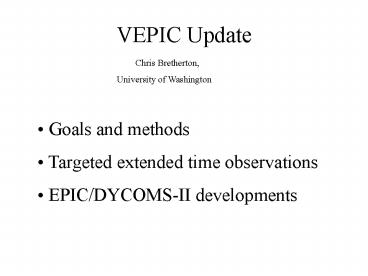VEPIC Update PowerPoint PPT Presentation
Title: VEPIC Update
1
VEPIC Update
Chris Bretherton, University of
Washington
- Goals and methods
- Targeted extended time observations
- EPIC/DYCOMS-II developments
2
VEPIC THEME
The theme of VEPIC is to better understand and
simulate how Eastern Pacific cloud systems
interact with the coupled ocean-atmosphere-land
system on diurnal to interannual timescales.
3
VEPIC Scientific Issues (VPM5)
- On what time and space scales does continental
heating/mechanical forcing impact boundary layer
cloud/radiative forcing? - How sensitive is the overall tropical circulation
and ENSO to variations of Eastern Pacific cloud
topped boundary layer properties and why? - What are dominant S/I feedbacks among Sc clouds,
surface winds, upwelling, coastal currents and
SST in E Pacific? - Does natural and anthropogenic aerosol
variability significantly modulate the Sc?
4
VEPIC STRATEGIES (VPM5)
- E Pacific as a testbed for model evaluation and
improvement (e.g parameterization development)
using multiscale data sets. - Model sensitivity studies to refine hypotheses
and target observations. - Synthesis and enhancement of existing data sets,
through targeted instrument procurement,
algorithm evaluation and development, and
enhanced observation periods. - Co-ordination with oceanographic, aerosol, cloud
process communities, including CLIVAR CPTs.
5
V E P I C
Galapagos I.
Lima
Arica
WHOI buoy
San Felix I.
6
EPIC2001 work continues
- Two BAMS articles submitted.
- AGU special session
- Possible joint meeting in Sept.
- with US PanAm CLIVAR
(Taneil Uttal)
7
TAO-EPIC has gathered a nice multiyear dataset
Yearly Feb-Apr precip in SE Pacific ITCZ
and freshening
Cronin
8
2.5 years of data from the WHOI stratus buoy (20S
85W)
Weller
9
Buoy shows large net heat flux into ocean
balancing eddy cooling
Weller
10
Ocean altimetry also shows an energetic eddy field
Weller
11
U. Chile has installed ceilometer and surface met
at San Felix Is.
Decoupled
Cloud base (ceilometer)
LCL (surface met)
Well-mixed
Mostly clear
Garreaud
Shows daytime rise of LCL, cld. base, with
synoptic variations
12
Daytime subsidence max
EPIC2001-Sc Diurnal Cycle (20S, 85 W)
10
dBZ
0
-10
Wood
13
Diurnal variation of horizontal surface wind
divergence from Quikscat
Wood
seabreeze
?
PM subsidence max
AM subsidence max
Hypothesis Subsidence wave driven by diurnal
heating cycle over Andes reaches buoy at noon.
14
MM5 simulation also shows late afternoon
convergence at coast, midnight ascent at buoy!
06LT
18LT
Garreaud
15
Remotely-sensed cloud microphysics from EPIC2001Sc
(Rob Wood, UW)
16
MODIS visible reflectance, 15Z 20 Oct. 2001
Polynya
17
Modis effective cloud droplet radius large
(clean) in polynya
small in coastal
pollution
18
DYCOMS-II RF02 Polynya drizzle feedback?
Stevens
19
DYCOMS-II Sc entrainment estimates from RF01
Stevens
20
Comparison of 6-day mean 20S 85W profiles with
models
(Peter Caldwell, UW)
- All models have adequate Sc, but too shallow a
PBL. - CAM2 LWC all in lowest 3 levels (70-630 m).
- Observed LWC mainly at 800-1300 m.
21
Other updates
- RICO trade Cu microphysics/turbulence
- (Antigua, Dec. 2004-Jan. 2005)
- www.rico.uiuc.eduww.rico.uiuc.edu
- Proposed CPT on tropical cloud feedbacks on
climate sensitivityincludes several US members
of VEPIC.
22
Conclusions
- VEPIC-related progress in
- Atm.-ocean feedbacks in E Pacific
- S America and SE Pac diurnal cycle of subsidence,
cloud - Importance of cloud/drizzle/aerosol coupling to E
Pac Sc. - Model/reanalysis validation
- using
- Existing data synthesis, targeted enhancements
(WHOI buoy, SFI), field expts. (EPIC2001/DYCOMS-II
.) - Coordinated modeling.
- Come to WG meeting to hear more about VEPIC and
participate in planning its future.

